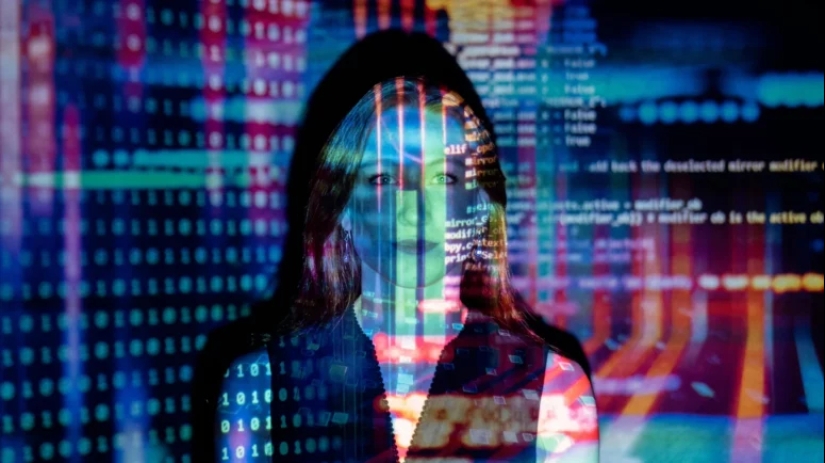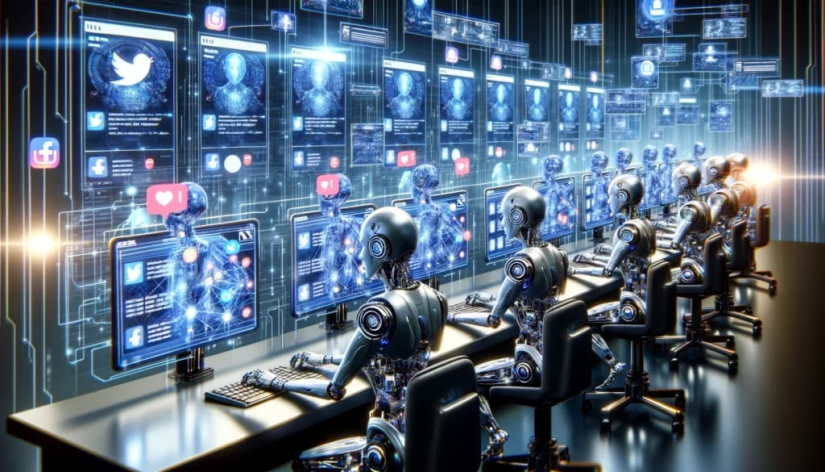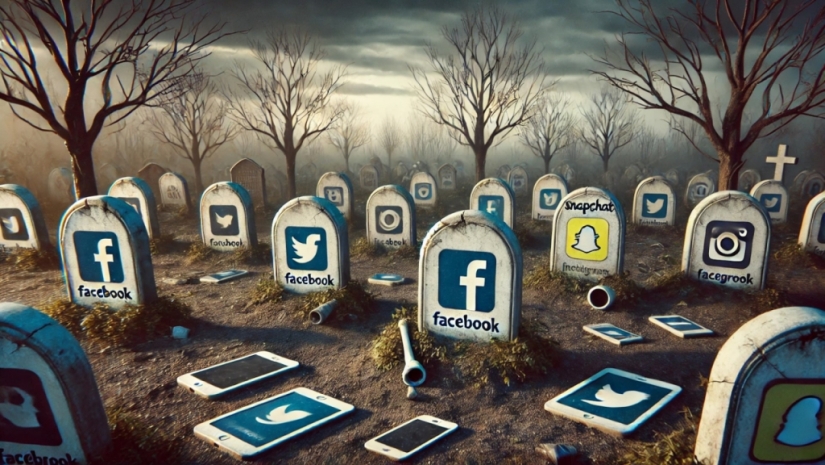The "Dead Internet" Theory: Why Living People Leave the Network
Categories: Culture | Society | Technology
By Pictolic https://mail.pictolic.com/article/the-dead-internet-theory-why-living-people-leave-the-network.htmlWhat if we told you this: the Internet died 7-8 years ago. Now, most Internet users are not people, but bots. They have filled social networks and forums. They write posts, organize discussions, generate strange pictures and videos with lifeless voiceovers. They like and discuss their own masterpieces, arrange disputes, spread conspiracy theories. There are almost no real people left on the Internet, and soon there will be none at all. This is exactly what the “dead Internet” theory sounds like, which we will talk about now.

If you are over 30, you probably witnessed the birth of the Internet in the 1990s and 2000s. Perhaps you have also noticed that the network is not what it used to be. Memes, public accounts, and discussions on the network look secondary, and sometimes even meaningless. You are haunted by a sense of déjà vu, just like the heroes of the cult film The Matrix.

If you recognize yourself in these feelings, congratulations — you are not alone. The “dead internet” theory, which is gaining more and more supporters every year, explains it quite simply. According to it, most interactions on the network are actually created by bots. Algorithms control discussions, shape public opinion, and push content created by real people into the background.
Behind all this, as the theory's supporters say, are corporations, IT giants and governments. Their goal is to manipulate human consciousness and promote their goods and services. Every year the situation becomes more complicated, and the participation of real people on the Internet is becoming less and less noticeable. But is this really a cause for concern? Or is this yet another conspiracy theory?
The idea of a “dead internet” was first raised by a user named IlluminatiPirate on the 4chan forum in the late 2010s. He suggested that the web “died” around mid-2010. In 2021, he expanded on this idea in a more detailed post on the Agora Road forum titled “Dead Internet Theory: Most of the Internet Is Fake.”

This post contains the following words:
According to IlluminatiPirate, government agencies and large corporations are to blame for all of this. The topic began to gain popularity, and an article in the well-known publication The Atlantic titled “You May Not Notice, But the Internet Died Five Years Ago” only accelerated the spread of the theory.
The number of supporters of the "dead internet" theory is growing every year. And it's easy to explain. In 2023, independent experts cited data: 49.6 percent of content on the network is created by bots, not people. The situation is changing every year, and, of course, not in favor of humans. Now imagine: the theory appeared even before neural networks began to be widely used.

At the end of 2022, ChatGPT was released, which marked the beginning of a new era. Since then, the artificial intelligence market has been booming. Many neural networks have appeared for ordinary users, combining advanced technologies with a user-friendly interface. According to statistics, the AI market will reach $244 billion in 2025, and will grow to $827 billion by 2030.
The "dead internet" sometimes has alarming and completely obvious manifestations. Many were truly shocked by the story of the popular social network X channel Historic Vids. There was a post about the Kazakh language. The video said that it sounds like an engine that is being started in winter. Former data analyst at McKinsey& Company Alexander Malakhov wrote about this case:

This case perfectly confirms the theory - one of the most popular social networks on the planet has invested heavily in creating bots to promote content. Elon Musk himself, the new owner of X, formerly known as Twitter, claimed that in 2022 the number of fake accounts on the social network could exceed 20-25 percent of the total number of users.
In the spring of 2024, Musk announced that X would introduce the practice of small payments for publications, likes, and other actions. According to the entrepreneur, this will help curb the onslaught of fakes and bots. After the emergence of ChatGPT and other similar services, the share of AI-generated content began to grow rapidly.

The main problem is that it is becoming increasingly difficult to distinguish between human-generated and neural network-generated content. This is especially true for texts. Work is already underway to create technologies that can effectively distinguish AI-generated content from human-generated content.
Grigory Shershukov, Product Director at Nanosemantics, believes that the threat of getting bogged down in generated content is quite real. AI is already capable of creating convincing texts, photos, and videos on a huge scale. This threatens the complete loss of the “human voice” in the digital space.
Everyone has encountered the so-called "AI slime". In the video you can see a cute puppy, but upon closer examination it becomes clear that it has an extra ear or a fifth paw instead of a tail. It can be even worse. For example, a selection of historical facts with a video sequence and good voice-over. However, most of this information turns out to be nonsense and misleads people.

But what if a schoolchild gets information from such “popular science” sources for a paper? Or an elderly person gets false medical information? In this case, such AI content can lead to tragedy. Not all people are critical of the facts they get online and check them carefully.
Unfair use of neural networks contributes to the spread of fake news. This is not only unpleasant, but over time will cause a complete loss of trust in information sources and make it difficult to find, verify and make informed decisions.

AI-generated fake news, such as about the death or illness of politicians, has already had an impact on the global economy and led to fluctuations in stock market quotes. Grigory Shershukov also lists other risks:
Social networks are actively integrating AI tools into their platforms. In doing so, they are putting themselves at risk. Many are familiar with short videos with excerpts from films, generously supplemented with online casino advertising. The video sequence is supplemented with a voice generated by a neural network. An inexperienced user may think that these videos are manually assembled, but this is not the case. All these videos are created by automated pipelines and a person is minimally involved in the process.

AI automation tools can generate hundreds of such videos in minutes. Such content lacks the individuality and warmth of human-made products. Although it is aimed at promoting accounts to make money, in the long run it works against the owner.
Social media users are gradually becoming disillusioned with social media, beginning to perceive it as a low-quality media space. All this calls into question the future of popular social networks. Information noise on the network contributes to the loss of interest of the audience and its disappointment in the platform.

Analysts note that smart algorithms are turning social networks into content streams from bloggers and brands. In this mass, there is almost no room for live human communication, for which such platforms were created. But the need for communication will not go away, so it is likely that Internet users will move to niche online communities, so far free from algorithms and attempts to monetize any action.
What do you think about the “dead internet” theory? Have you noticed in recent years that there is less live communication and more weird, impersonal content online? Share your observations in the comments — perhaps your perspective will help clarify how “alive” we are in this digital world.
Recent articles

It's high time to admit that this whole hipster idea has gone too far. The concept has become so popular that even restaurants have ...

There is a perception that people only use 10% of their brain potential. But the heroes of our review, apparently, found a way to ...

New Year's is a time to surprise and delight loved ones not only with gifts but also with a unique presentation of the holiday ...